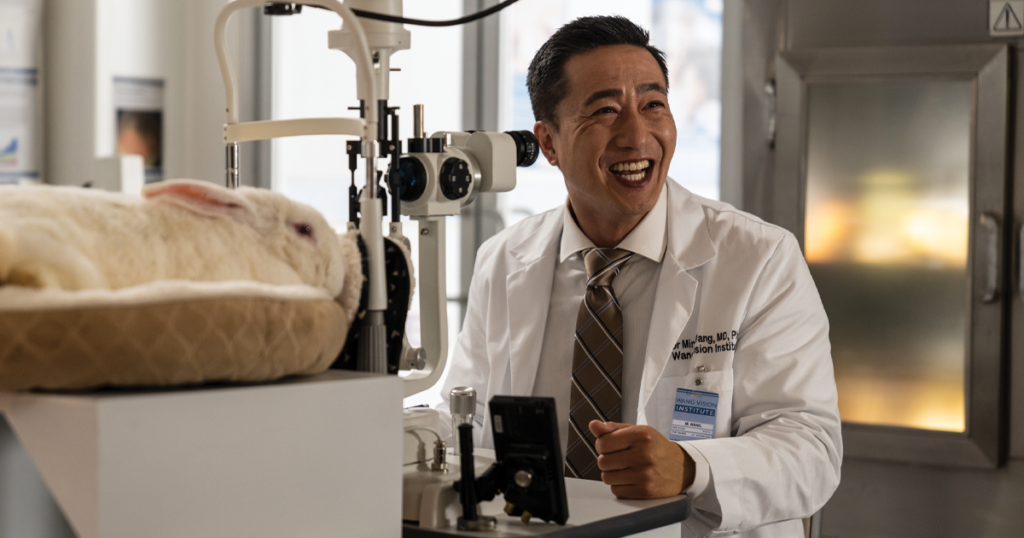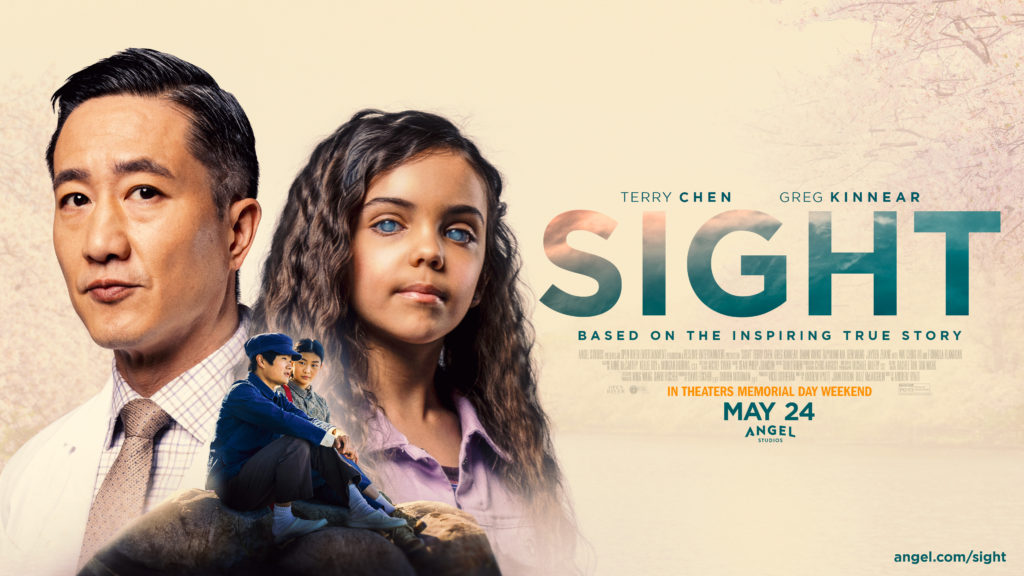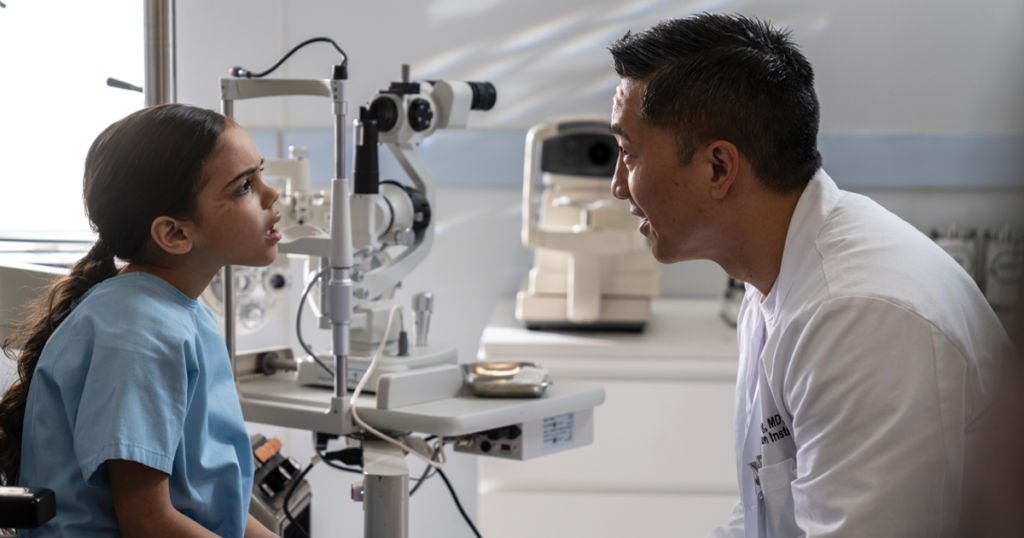Interview with “Sight” Movie Producer David Fischer
"When I met Dr. Ming Wang in 2014, I realized his journey toward faith was a subtle one and that a biopic of his life should reflect that subtly."
The movie, “Sight,” tells the story of Dr. Ming Wang (Played by Terry Chen), a Chinese immigrant turned world-renowned eye surgeon. When a blind orphan arrives in his waiting room seeking a miracle, Dr. Wang must confront his past – and draw on the resilience he gained growing up in China during the Cultural Revolution – to try to restore her sight. Drawn to this true story of faith, David Fischer, Executive Producer of “Sight,” sat down with the War Cry to discuss his role in producing this remarkable project and the incredible story it portrays.
Caleb Louden (CL): David, could you please say a little bit about this movie and give us a synopsis?
David Fischer (DF): The film portrays Dr. Wang, an eye surgeon who is the best in the world in his field in early 2000s Nashville, Tennessee. Still, Dr. Wang deals with loneliness despite his incredible career success. We show him going home and his refrigerator is empty. He doesn’t have anybody there. Suddenly, the busyness of his world is very quiet when he goes home, and we end that scene with him just eating dinner alone at a diner because he doesn’t want to sit at home alone.
His life takes a turn when he is brought a young girl from Kolkata, India, who was intentionally blinded and left to die. Dr. Wang races against time to restore her sight, delving into his own past as he does so, which involves the terrible times of the cultural revolution in China. Somewhere in the ballpark of 50 million people either died or went missing during that period of Chinese history. The communist government closed all the universities. To this day, not all that happened in those days is known.
The film explores the theme of overcoming personal tragedy and coming to terms with the past to live fully in the present. Dr. Wang realizes that forward progress depends upon moving the major rocks of his past out of the way and making peace with his past. “Sight” reflects on the idea that life is more than meets the eye, and we play with that theme quite a bit and try to figure out with the audience what that means.

CL: “Sight” doesn’t tell the story of Jesus or have an overtly evangelistic message, but it still reflects a Christian worldview. Can you speak to how a Christian perspective shapes “Sight?”
DF: When I met Dr. Ming Wang in 2014, I realized his journey toward faith was a subtle one and that a biopic of his life should reflect that subtly. He came to the United States as an atheist and excelled in science and technology. In medical school, he became fascinated by the complexity and perfection of the human eye and discovered that Darwin found the human eye perplexing. Darwin remained a believer in God because the eye is so astoundingly complex. He couldn’t figure out how evolution could produce something like that over thousands or even millions of years. How could that evolve? It’s impossible, especially something that only takes nine months to produce in the womb.
A professor actually came up to Ming, and this is all in his book. We don’t put it in the movie, but a professor brought him outside, and he said, “Ming, what’s the difference between that car across the street and your human eye, that car engine and your human eye?” He said, “Well, the human eye is more complex than a car engine. The car engine’s complex, but the human eye is more complex.” He said, “Can you imagine just randomly car parts coming together to form an engine and how long that would take?” He said, “It’d be impossible. There’s no way.” He [the professor] said, “So how impossible is it for an eyeball to randomly be assembled and come together? For the human to randomly come together and over millions of years.”
That conversation just stopped him for a moment, and he realized it was not random; it was intentional, and there was a creator, and he came logically to the place of it’s more logical to believe in a creator that’s outside of time who actually created this than that this all came together randomly. This realization led Dr. Ming to believe in a creator and eventually to Christianity. His faith journey is actually featured in another movie, “God’s Not Dead,” as the Chinese student who comes to faith is based on him.
The movie really portrays the faith that emerges through the experiences of the Indian girl named Kajal. The audience sees how so many pieces of Kajal’s journey to Dr. Ming were improbable if not for God’s providence. The film doesn’t preach but encourages viewers to contemplate their own beliefs and values. We aim to prompt the audience to ask themselves deeper questions about their own worth. In a world driven by utility and value, it’s crucial for individuals to explore their intrinsic value beyond their abilities and contributions to others – to contemplate the deeper value that motivated Dr. Ming, Christian love. This perspective is woven into the narrative of the movie, allowing the audience to arrive at their own conclusions.

CL: How did you come to this sort of work? How did you become involved in film?
DF: My mother was a Broadway actress. My dad was a Brooklyn Jewish salesman. They met in New York. 3 months after they met, a baby was on the way. Mom dragged this Brooklyn Jew to Minnesota. He had never seen a cow in a field before. So, she drives this guy there. After 14 years, I was born at the tail end of their marriage, and my parents got divorced when I was young. Dad passed away and Mom raised us with a real sense of spirituality and a real sense of the arts. So, she always wanted us to be close to the arts. She always believed that of the good, the true, and the beautiful, you really can’t get to the good and the true without leading with beauty.
So, beauty always captures the eye. It draws us in. Why is music so powerful? Why are movies so important? Why is good food [powerful]? Why does it draw us in? Why do we want to break bread before we get to the good and the true? So, I was very intrigued with the idea of using art, beauty to actually get to goodness and truth in people’s lives. That actually led me to wanting to become a minister. I wanted to preach the gospel to people across the world. I did missionary work. What it ultimately, funny enough, led me to is becoming a lawyer.
I wanted to be involved in people’s lives when they needed someone to trust; when they were vulnerable, and they needed the best person to communicate with. I saw that in ministry, but I also saw that in law. I went that direction and where it led me was towards families that have the ability to give back charitably. So, I developed an entire practice around trusts and annuities and donor-advised funds and foundations, and I was a young attorney developing a career in a space where I was sitting at the table with people 10, 20 years older. I shouldn’t have been at that table, but I kind of represented the foundation and so I was at that table, and so I got to soak in all of this really interesting information about what drives a family to want to give back, and then how to actually position that family in a way where they can receive the experience that they deserve to receive in giving of their money to make something happen in the lives oftentimes of nonprofits, of charitable endeavors and also family members, kids and grandkids. How do you create the right kind of approach?
That led to a film company in California of all things finding out about me through mutual connections, and they said, ‘We need someone to help build our development capital,’ which is the stuff that you use to buy the rights of books, to develop scripts, to hire screenwriters, etc. ‘We need development capital and you’d be the perfect person to raise the money because the film industry might as well be a donation.’ It’s very hard to make money in film. So, you have to bring people in that understand this is about a movement, it’s about something that’s just more important in that space. So, it started my career in 2011 in feature film.
I met Dr. Ming Wang here in Nashville, Tennessee in 2014. When I sat down and had dinner with him one-on-one and heard his story, I was in tears. It so deeply impacted me, and I thought this needs to be told to the world. So that relationship started. We spent about two to three years working on his autobiography, “From Darkness to Sight.” I interviewed about four different ghost writers, went to three different publishing houses, and really fine-tuned his story and his life. I joke I know his life better than his parents. I know everything about his life, the good and the bad, and there’s plenty of it all across the board. We tried to figure out what’s the thread that we want to capture for your autobiography? We got Senator Bill Frist to write the foreword for the book. The introduction and everything into it was all about how sight is more than just physical. There’s more to it. So we really played with that.
In 2017, when the book was finished, I was ready to get a screenplay written and we went after it, and we built the film out. We got the full team involved. Andrew Hyatt is my director. He did the movie “Paul, Apostle for Christ.” He wrote and directed that. He just wrote and directed the movie, “The Blind,” about Phil Robertson and the “Duck Dynasty” family. We filmed in Vancouver. It was during COVID, so we had to build China in Vancouver. We had to build MIT and Harvard in Vancouver. We had to have people tested every other day. We had to have people on set that were spraying things down with fog after every single scene. There was intensity about everything. But we got through it. In post-production, I hired a 40-piece orchestra out of the Clint Eastwood’s studio at Warner Brothers to do an entire piece. We had a composer work an entire piece where East meets West musically, reflecting the life of Dr. Ming Wang.
Then I was looking for a distributor. You can have all the stuff you want at the end of the day, but if you don’t have a distribution partner that really believes in your project, it sits on the shelf and it gets dust. I thought Angel Studios would be a great partner in this process. We submitted our film to their guild, which is about 250,000 members. They post the project with their members, and then about 1,000 of them vote on our project. You have to get very high ranks to get through the guild. Very few films get through. That just gets you to the next gate. We got through with flying color. It was just amazing how they responded to this film. Now we are part of the Angel family with a release date over Memorial Day weekend.
“Sight” was released on May 24, 2024 and stars Terry Chen and Greg Kinnear. It can be seen in theaters nationwide.







